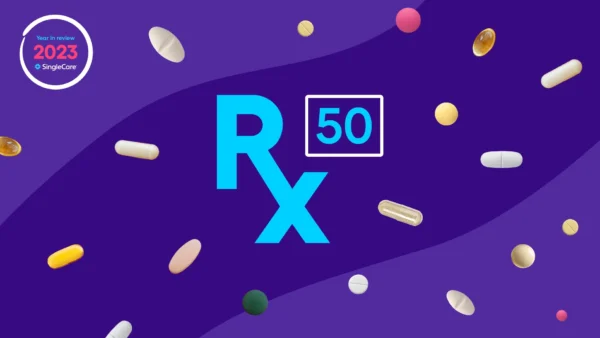You may assume that prescriptions for common summertime ailments—like swimmer’s ear, bug bites, or poison ivy—would be the most popular during the month of July. You’re outside, enjoying the pool or a beach, and exposed to all the rashes and stings nature has to offer. However, the two classes of drugs on the rise in summer on SingleCare are mostly related to cardiovascular issues: diuretics and antihyperlipidemics (specifically statins).
While heart problems might not be the first thing that comes to mind when you think of summertime, hot weather may stress the cardiovascular system as your body tries to keep cool. This in turn may impact heart health and blood pressure—two conditions these medications help to regulate.
These are the top 5 medications in each category for July, according to SingleCare’s data.
Diuretics
- Hydrochlorothiazide (generic prescription generally used to treat high blood pressure, but may be used as adjunctive therapy for edema, or water retention)
- Furosemide (generic Lasix)
- Spironolactone (generic Aldactone)
- Triamterene/hydrochlorothiazide (generic Dyazide)
- Chlorthalidone (generic prescription generally used to treat high blood pressure, but also may be used as adjunctive therapy for edema)
Antihyperlipidemics (statins)
- Atorvastatin calcium (generic Lipitor)
- Simvastatin (generic Zocor)
- Pravastatin sodium (generic Pravachol)
- Rosuvastatin calcium (generic Crestor)
- Lovastatin (generic Altoprev)
These prescription medications are used to lower the risk of stroke, heart attack, and other heart complications in people with diabetes, coronary heart disease, or other risk factors.
Why are diuretics popular in July?
Diuretics, also known as water pills, are one of the most commonly prescribed medications for a number of medical conditions ranging from heart disease to high blood pressure, says Anita Gupta, DO, Pharm.D., MPP, an adjunct assistant professor of anesthesiology and critical care medicine and pain medicine at the Johns Hopkins University School of Medicine. “This group of medications keep the kidney’s function of eliminating sodium and water from the body while balancing our blood volume safely,” she explains.
There are several different classes of diuretics, and the most popular medications on SingleCare represent three of the most common diuretics: loop diuretics (furosemide), thiazide diuretics (hydrochlorothiazide, chlorthalidone), potassium-sparing diuretics (spironolactone, triamterene). Each class works slightly differently to help your kidneys eliminate extra water and salt—and one, spironolactone, can even be used off-label to treat acne.
Patients who have been diagnosed with heart failure, Dr. Gupta says, will often require these life-saving medications in order to maintain adequate water balance. Heart failure is a serious condition that occurs when the heart cannot pump enough blood and oxygen; it affects approximately 6.5 million adults in the U.S., according to the Centers for Disease Control and Prevention (CDC). “These individuals are likely to suffer from edema (or excess fluid trapped within the body’s tissues) and diuretics can help maintain healthy blood pressure so that the heart can pump blood through the heart during each heartbeat.”
Linda Girgis, MD, FAAFP, a board-certified family physician in private practice in South River, New Jersey, and a clinical assistant professor at Rutgers Robert Wood Johnson Medical School, says that the hot temperatures in July can worsen swelling in the legs, ankles, and feet—the common symptoms of edema. “It’s possible that this problem would make adults seek medical care,” she continues. “So it would make sense that doctors have prescribed more diuretics during the summer.”
RELATED: Bumex vs. Lasix: Main differences and similarities
Why are cholesterol medications popular in July?
Antihyperlipidemic agents include a popular class of medications known as HMG CoA reductase inhibitors, more commonly referred to as “statins.” They are used to lower “bad” cholesterol levels—or LDL, explains Dr. Gupta. They can also lower triglyceride levels and increase “good” cholesterol—HDL. “These medications are essential for two reasons: One, they lower cholesterol, and two, they can protect the heart from heart disease,” she continues. “In fact, research has shown that statins can be useful for the protection of hardening of the arteries, prevention of strokes and heart attacks, and extending life expectancy.”
The most common statins on SingleCare in July (atorvastatin calcium, simvastatin, pravastatin sodium, rosuvastatin calcium, lovastatin) are all generic medications that are well-studied, and considered the “gold standard” for treating high cholesterol. Meaning, they have been around for a long time and are considered safe and effective by most medical professionals.
High cholesterol (hypercholesterolemia)—a cardiovascular condition that has no signs or symptoms and occurs when the body contains too much LDL cholesterol (cholesterol carried by low-density lipoprotein)—affects about 1 in 3 American adults, states the CDC. According to the agency’s latest statistics, 95 million adults over the age of 20 have total cholesterol levels higher than the normal range (200 mg/dL), where an estimated 29 million adults have levels higher than 240 mg/dL. Anyone living with high cholesterol has an increased risk of heart disease, the number one leading cause of death.
As for statins, more than 11 million Americans are taking this class of drugs for atherosclerotic cardiovascular disease (ASCVD), according to statistics from the most current National Health and Nutrition Survey. Dr. Girgis explains that the increase in prescriptions could be connected to the same patients who are dealing with swollen legs in July.
“We often do bloodwork in patients with edema to rule out other disorders, such as liver or kidney disease, thyroid disorders, and electrolyte abnormalities,” she states. “It could be that the physicians are diagnosing more cases of high cholesterol when doing these labs, which could explain the uptick in lipid lowering medications, as well.”
Dr. Girgis adds that the aging U.S. population could be another possible reason why people with SingleCare cards filled more prescriptions for diuretic and antihyperlipidemic drugs. “As people grow older, we can expect the use of these medications to be increasing, so perhaps it’s just a sign of a slow rise.”
RELATED: The 4 possible side effects of statins (and how to combat them)
Communicate with your healthcare team
Generally speaking, Dr. Gupta says that diuretics are prescribed long-term for chronic conditions such as hypertension, heart failure, or kidney disease. “Individuals who are on diuretics may require monitoring of potassium and kidney function,” she states. It’s important to weigh yourself regularly when taking diuretics for heart failure, which will help track your body’s fluid retention or even excess loss. Unless otherwise advised by your doctor, contact them if your weight increases more than three pounds in a day or five pounds within a week, or if you lose too much weight, suggests medlineplus.gov (a website produced by the United States National Library of Medicine).
If you’re diagnosed with elevated cholesterol levels, Dr. Gupta advises having a risk assessment to determine if statins are an appropriate medication to consider using long term. “Since risks can change over time, discussing this with your physician can help determine if the prescription will be required over an extended period,” she says.
Working closely with your healthcare provider, you can maintain heart health through summer and beyond.











